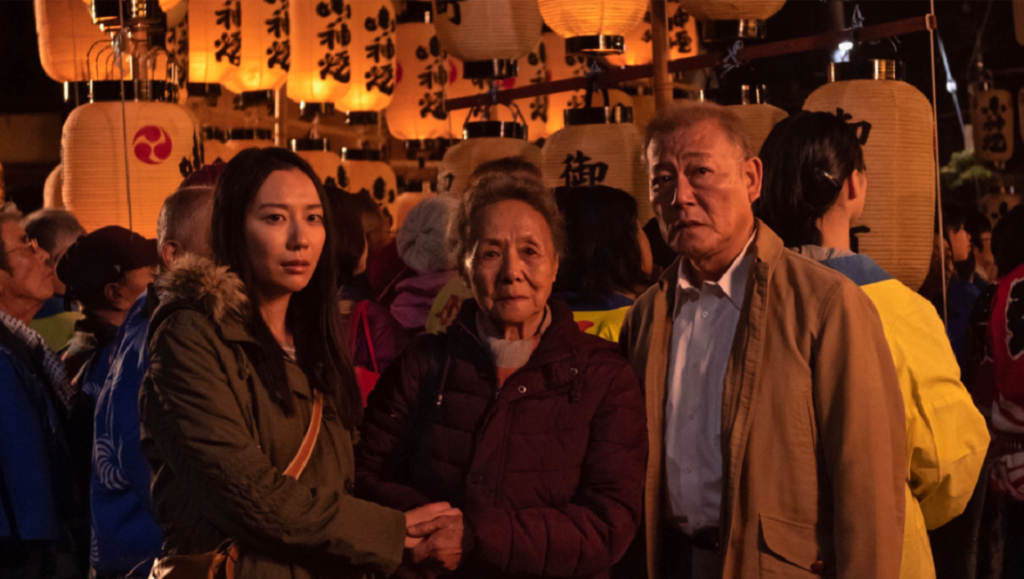Tracing Her Shadow, the third feature by Song Pengfei (whose films are credited to just his given name), deals with a relatively little-known historical tragedy: the Japanese “war orphans” of World War II, the children left behind in the Manchurian northeastern region of China when Japanese soldiers and settlers fled the country after Japan’s defeat and surrender. Many of these children were adopted by local Chinese families, but they were often discriminated against because of their Japanese heritage, and national anger at the atrocities inflicted by Japan on China during the war. When relations between Japan and China were normalized in 1972, many of these war orphans moved to Japan, hoping for more acceptance from their ancestral homeland. But unfortunately, discrimination awaited them there as well.
For most other filmmakers, this premise would likely occasion a soppy, blatantly heartstring-tugging melodrama. But Song takes a far more resonant approach here, incorporating humor and warmly observant human interactions and accumulating a series of beautifully rendered moments, often performed without dialog. Song was previously an assistant director for Tsai Ming-liang, and while his own films are stylistically quite different from Tsai’s, Song has obviously picked up more than a few pointers from his former mentor — especially on how to effectively use pure cinema language to get one’s message across.
After an energetically animated sequence illustrating his story’s historical background – Song’s way of clowning the deadly-somber methods other directors use to impart similar — we’re brought back to 2005, when elderly Chen Huiming (Wu Yanshu) travels from her home in China to Nara, Japan to search for her adopted war orphan daughter, Lihua, whom Huiming has lost touch with after several years. Huiming stays with Hatsumi Shimizu (Ying Ze, star of all three of Song’s features), a young woman of mixed Chinese-Japanese parentage whose Japanese father was a war orphan cared for by Huiming as a child. Because of this family connection, Hatsumi agrees to help Huiming in her search. Hunming is assisted by a retired policeman, Kazuo (Jun Kunimura), who’s also a patron of the bar where Hatsumi used to work, claims to have seen Lihua, and tries to use his old police connections to help track her down.
Song dramatically illustrates the difficult lives those of mixed ethnicities face in Japan, including the attendant discrimination inflicted upon them; Hatsumi has recently broken up with her boyfriend, largely because his parents were violently opposed to their son marrying a half-Chinese woman. Differences of culture and language often prevent people from communicating with one another, but Song’s characters invent clever ways to overcome these difficulties. In Tracing Her Shadow’s funniest scene, Huiming is unable to communicate to a Japanese butcher (Song himself, in a cameo role) which meat that she wishes to buy, so they converse with each other using animal noises. Later, in one masterfully acted and dialog-free sequence, Huiming and Kazuo exchange old photographs between themselves.
Tracing Her Shadow is Song’s second film at CineCina; his previous feature, the utterly charming and lovely The Taste of Rice Flower, screened at the festival’s inaugural edition, in 2019. The new work exhibits similar qualities as the old, particularly in its admirable restraint to not go for the obvious, tear-jerking moments. Song originally conceived his latest as a war film, but after hearing stories from war orphans about their experiences, he pivoted to the exquisite form which the film has now taken. Finally, Tracing Her Shadow’s parting gesture perfectly encapsulates the eradication of national/cultural barriers to which Song so passionately advocates: “Goodbye My Love,” by the beloved Taiwanese chanteuse Teresa Teng, sung in Japanese, soundtracking a film by a Mainland Chinese national.
Published as part of CineCina Film Festival 2021.


Comments are closed.